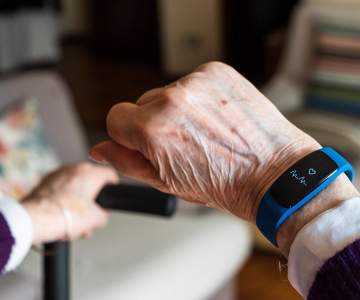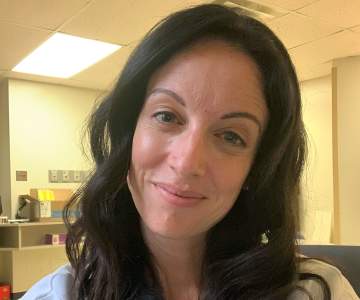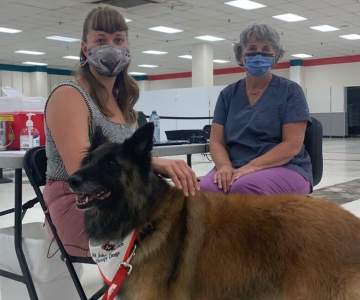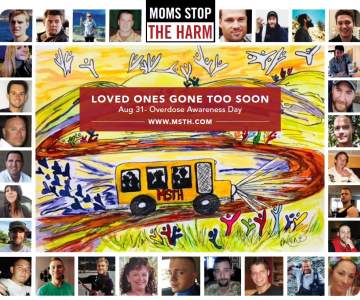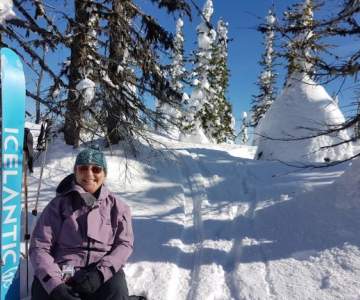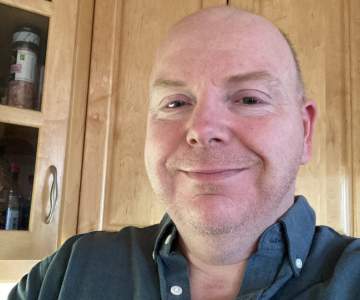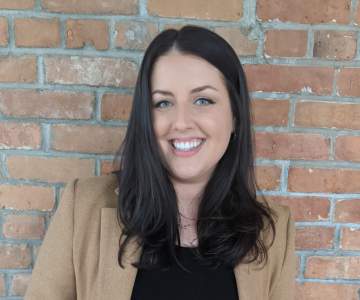Breadcrumb
Explore Stories
2 Minute Read
Research & Innovation
Wearable health technologies are vastly popular with people wanting to improve their physical and mental health. Everything from exercise, sleep patterns, calories consumed and heart rhythms can be tracked by a wearable device.
But timely and accurate data is also especially valuable for doctors treating patients with complicated health conditions using virtual care.
A new study from the Southern Medical Program (SMP), based at UBC Okanagan, has examined the use of wearable health technology and telehealth to treat patients with Parkinson’s disease.
Dr. Daryl Wile, a movement disorder specialist and SMP clinical assistant professor, routinely uses telehealth to connect with Parkinson’s patients across the vast and rugged landscape of BC’s Interior.
“Even prior to the pandemic, telehealth helped deliver specialized care to patients living in remote and rural settings,” says Wile, a clinical investigator with the Centre for Chronic Disease Prevention and Management. “But with the complex nature of Parkinson’s, we wanted to enhance these appointments to better understand how movements vary throughout a patient’s entire day.”
To add a new layer of health information, Wile and the research team added wearable technology to the equation.
“We recruited Parkinson’s patients with either tremors or involuntary movements,” says Joshua Yoneda, SMP student and co-author of the study. “We then divided them into two groups — some using telehealth and device-based health tracking and others attending traditional face-to-face appointments.”
The telehealth group wore wearable devices to track their movements, involuntary or not, throughout waking hours. The reported data was then reviewed during telehealth appointments to identify peak times patients experienced Parkinson’s symptoms.
“With the integration of accurate and reliable data from wearable devices, we were able to tailor a patient’s medication to better manage their symptoms throughout the day,” adds Wile.
As part of the study, patients were asked a series of questions from the standardized Parkinson Disease Quality of Life Index. Both study groups were assessed at intervals of six weeks, three months and six months.
Overall, the patients using the wearable devices reported positive experiences and health outcomes in combination with telehealth appointments to access specialized care.
“There’s definitely a strong case to leverage multiple technologies to improve a patient’s quality of life and limit the added stress and cost associated with travel,” says Yoneda.
The study was recently published in Parkinsonism & Related Disorders.
This article was originally published by UBC Okanagan.
2 Minute Read
Community & Culture
We are IH is a recognition campaign to spotlight Interior Health employees and medical staff – through pictures and stories.
Name: Emily Lindsay (she/her)
Job Title: Clinical Dietitian
Years of Service: 10
Worksite: Vernon Jubilee Hospital (VJH)
Community: Vernon
Ancestral Territory: “Syilx” (Saay-ilks) / Okanagan Interior Salish
Favourite Quote: "No act of kindness, no matter how small, is ever wasted." -Aesop
Born and raised in Williams Lake, B.C., Emily Lindsay, is a second-generation health-care professional. Her parents' influence - both having worked in health care - piqued her interest in a health-related career, and dietetics seemed the best choice as it combined her love of food and science.
"I enjoy my career as nutrition has such an important role in all aspects of health and dietitian involvement can greatly improve patient outcomes."
Emily completed her undergrad at the University of British Columbia and a one-year internship at the University Hospital of Northern British Columbia in Prince George, with placements around the province. After working one year in Fraser Health, Emily moved to Vernon with her husband and has worked with inpatients ever since ("so much for me thinking I was going to have my own cooking show when I graduated!").
Loyal, dedicated and caring, for Emily the patient comes first. Recently, she worked with an elderly patient who was worried whether he could return home with his wife due to his increased care requirements with his percutaneous endoscopic gastrostomy (PEG) tube feed. With extra teaching and support from the dietitian team and nursing staff, plus community follow up, he and his wife are fully independent with his feedings.
"It was a true example of teamwork and patient-centered care. It was fulfilling to see him be able to return home."
Emily loves cooking and baking, listening to country music and gardening. Her athletic pursuits include downhill skiing, running and chasing after her four- and six-year-old children. She's looking forward to getting back to travelling soon.
Emily's nomination keeps the We Are IH loop going:
Dan Meyer. “Our pharmacists are awesome resources when it comes to questions around micro-nutrient dosing, symptom management and medication side effects. We are always so thankful for their expertise. And Dan is just fun to work with!" - Emily Lindsay
Stay updated with careers at Interior Health
Facebook: Interior Health | Instagram: interiorhealthbc
| LinkedIn: Interior Health Authority
2 Minute Read
Community & Culture
Are you delaying or avoiding getting your COVID-19 vaccine because of anxiety or fear about needles?
Therapy dogs have been on hand at many clinics recently. They help alleviate stress and provide emotional support for people who are nervous about getting their shot.
“Our therapy dogs visit a variety of health-care facilities in the province and have proven to be a calming and positive presence for those experiencing stress or anxiety," says Ty Spear with St. John Ambulance BC/Yukon.
“When our therapy dogs are on-site, a moment of joy with them goes a long way to soothe the nerves. Our whole team is excited to provide support to B.C.'s vaccine efforts.”
All of our immunizers are trained and can help you get your vaccine safely and easily.
Tips for a good experience when getting your vaccine:
Let your immunizer know that you experience stress or anxiety with needles or injections.
Your immunizer can help you find a comfortable position. If you have a history of fainting or are worried about fainting, you can receive your vaccine laying down.
If you are more comfortable sitting up, your immunizer can help you focus on breathing and distracting exercises, or you can have a conversation.
You can bring your own distractions, like music, videos, or reading materials.
How to get vaccinated
Get your first or second dose of a COVID-19 vaccine by visiting an Interior Health vaccine clinic.
To make an appointment, register online at: www.getvaccinated.gov.bc.ca/, call 1‑833‑838‑2323, or visit a Service BC office listed here, and then book an appointment.
4 Minute Read
Community & Culture
August 31 International Overdose Awareness Day - it is a time to remember and take action about the overdose crisis.
Addiction and overdose can affect anyone. However according to the BC Coroners Service in 2021 so far 70 per cent of those dying were aged 30 to 59. Non-Aboriginal males accounted for 79 per cent of deaths. 85 per cent of illicit drug toxicity deaths occurred inside, with the majority in private residences. In 2021 so far, 39 per cent of deaths were among people over the age of 50. First Nations are disproportionately impacted - while they make up 3.3 per cent of the provincial population, 14.7 per cent of overdose deaths were First Nations people.
For questions about mental health and substance use supports in your community call 310-MHSU. If you need urgent help call the Interior Crisis Line at 1-888-353-2273.
Stigma continues to be one of the biggest barriers for people who use substances. The shame and blame associated with addiction prevents people from reaching out for help and forces them to use alone, putting them at risk of overdose. One of the simplest things we can all do is choose to use non-stigmatizing language when we are talking about substance use and overdose.
Events in your community
Over the last number of years, communities across the IH region have held events and led initiatives for International Overdose Awareness Day. Individuals, groups and organizations from various communities are coming together to plan activities on August 31. Planning is still underway and details will be shared as they become available. We will continue to update this page. * Note: Plans are also subject to change in response to local wildfire and COVID-19 concerns. Please respect all COVID-19 protocols.
Castlegar: Saturday, Aug. 28, 9 a.m. - 1 p.m. at the Farmer’s Market a booth will be set up to honor loved ones lost to overdose, raise awareness, and provide education around harm reduction and overdose.
Cranbrook: Public event noon - 4 p.m. 209A 16 Ave. N. Art display, harm reduction info, food, memorial and music. Details at www.EKNPUD.org.
Grand Forks: Aug. 28 - Information booth to be located downtown, public walk and candlelight vigil. Information table downtown from 9 a.m. - 2 p.m.; march at 10 a.m.; vigil at 7 p.m.
Kamloops: In-person gathering hosted by Addiction Matters Kamloops. Candle display and evening event on Aug. 31 at MacDonald park (5-7p.m.) Poetry, music, naloxone training, bannock. Free and open to the public.
Kelowna: Annual Moms Stop the Harm event supported by the Community Action Team. Naloxone and drug testing demos, speeches and a candlelight vigil at Kerry Park at 7 p.m.
Nelson: Cottonwood Falls park event Aug. 31, 1 - 3 p.m.
Okanagan: Collaborative planning by Moms Stop the Harm and Aboriginal partners for the Purple Ribbon campaign and caravan.
Oliver: Outdoor awareness billboard by Moms Stop the Harm. Public event 10 a.m. - 3 p.m. at Oliver Eats (6060 Station St.) with pancakes, haircuts, counselling on site and more.
Penticton: Public event 10 a.m. - 4 p.m. at Gyro Park in Penticton on Aug. 31. Memorial table, drug checking demonstrations, harm reduction info and Naloxone training on site.
Trail: Purple ribbons and posters will line major streets in Rossland and Trail. The Trail bridge will be lit in purple. An interactive educational kiosk at the Cenotaph (Pine Avenue) will provide information about overdose.
Williams Lake: In person public event - details to come.
Everyone is invited to tune into a LIVE STREAM Facebook Candlelight Vigil Aug. 31 at
6:30 p.m. by Moms Stop the Harm. The vigil will be an evening of music and words of remembrance featuring guest speakers: Lisa Lapointe, BC Coroner and Dr. Jennifer Charlesworth, BC Representative for Children & Youth, and Leslie McBain, Co-Founder of MSTH. Go to the Moms Stop the Harm Facebook page to livestream this special event. Or, check out the online event from provincial Overdose Response Community Action Teams, featuring a panel of well known experts such as Guy Felicella, Leslie McBain, and others. Aug. 31 8:30 - 10:30 a.m.
If you'd like to participate and spread awareness, here are a few other ideas to consider:
Promote and take the Every Word Matters pledge at www.addictionmatters.ca
Wear purple to support overdose awareness
Display a purple ribbon at your worksite or home
Attend the Moms Stop the Harm live stream candlelight vigil on August 31 at 6:30 p.m. PST
Visit www.overdoseawarenessday.com to learn more and access printable materials
If you are aware of events that aren't listed here yet please let us know - contact Jessica Mensinger for more information. For information about the overdose crisis and Interior Health's response visit www.interiorhealth.ca.
3 Minute Read
Community & Culture
We are IH is a recognition campaign to spotlight Interior Health employees and medical staff – through pictures and stories.
Name: Tanja Stockmann (she/her)
Job Title: Environmental Sustainability Manager
Years of Service: 8
Worksite: Kootenay Boundary Area Office, Castlegar
Community: Rossland
Ancestral Territory: Syilx (Saay-ilks)/Okanagan Interior Salish and Ktunaxa (Tun-ah-hah)/Kootenay Ktunaxa
Favourite Quote: "If you look really closely, most overnight successes took a really long time." -Steve Jobs
Tanja has sound advice to live by: be patient and have faith in people. This makes sense, given her career in environmental sustainability. She's gets her inspiration from the possibility of change and being part of that change.
"I chose this career because even small changes can make a difference and eventually, they all add up to make a real difference. Climate change is expected to change the health of our population, so anything we can do to limit climate change, hopefully will result in less changes to human health."
Tanja reflects that one of her proudest moments at Interior Health is working with students from various environmental sustainability programs, who spend four months in their practicum.
I've worked with some incredible students over the years and their energy and enthusiasm always regenerates me, gives me new perspectives, and enables me to learn more and share my experiences. I keep in touch with almost all of them and have watched their careers transition. Knowing I was a small part of their journey gives me a lot of satisfaction. It's a huge privilege to be part of their lives.
Tanja hails from Ottawa, Ontario and moved to B.C. in 2013 for her position with Interior Health as Environmental Sustainability Manager. When not at work, she spends time outdoors, travelling by motorcycle, mountain biking, ski touring, alpine and XC skiing and hiking. Living in Rossland gives her very easy access to nature!
Tanja riding her BMW 750 GS.
Along with the outdoors, Tanja enjoys time with a paint brush in her hand painting scenes of people doing the same activities she loves to do.
I love painting - it uses the creative part of my brain, which also needs exercising some days. It's a great way to unwind, get messy and laugh at the results.
Tanja's passion for environmental sustainability has been a huge asset for Interior Health, as our organization works to limit the impacts health care has on the environment.
Looking ahead, Tanja is looking forward to travel beyond our borders and getting back to being around one another.
Rossland range of the Monashee Mountains on route to a cabin.
Tanja's nomination keeps the We Are IH loop going:
"I'd like to nominate Lorne Sisley, Corporate Director, Facilities Management and Operations. Lorne has been with IH for more than 10 years. He's held a few different roles during this time and her is an excellent leader."
Stay updated with careers at Interior Health
Facebook | Instagram | LinkedIn
2 Minute Read
Community & Culture
We are IH is a recognition campaign to spotlight Interior Health employees and medical staff – through pictures and stories.
Name: Marc Fex
Job Title: Activity Worker
Years of Service: Less than a year
Worksite: Various
Community: Central Okanagan
Ancestral Territory: “Syilx” (Saay-ilks)/Okanagan Interior Salish
Favourite Quote: "There is no such thing as failure."
Born in Ottawa and raised in Langley, B.C., Marc Fex's inspiration every day is to put a smile on the faces of people he works with. As a fairly new Activity Worker with Interior Health, having started in December 2020 as a greeter at a COVID-19 testing site, Marc's proudest moment so far is joining the IH team. He loves being able to interact with people and make their day.
Marc describes himself as enlightened, caring and fun-loving - all attributes that go a long way in his chosen career. He supports seniors that use our centres, including doing activities, helping with meal times, exercising with them and sharing stories.
Marc's beautiful wife, Kathy
Something you probably didn't know about Marc? He wrote and recorded a song called " Hey Girl," which aired back in 2002 on the University of British Columbia radio station, CiTR.
Marc also started his own YouTube channel about four years ago.
"I go to dealerships and do walkaround reviews on ATVs, UTVs, outboard engines, boats, sleds, dirt bikes, etc. My biggest love is ATVing. I wanted to get plugged into the industry a little more and stay in the loop of technology. I'm excited with my channel's growth!"
ATV ride at Clear Creek Hot Springs around Harrison, B.C.
Marc's always had a love for the back country, starting shortly after he got his driver's licence. Over the years, off-roading with trucks and jeeps turned into hitting the back country on ATVs. Marc says, "it's an amazing feeling to find a lake you've never seen before. To spend time in a peaceful, quiet place."
The dock at Bouleau Lake
Marc's nomination keeps the We Are IH loop going:
Kara Cooper. “Kara genuinely cares about her staff. She's easy to approach and always open to finding the best solutions. She's always thinking ahead as to what our needs might be or what might make our work lives easier. I can tell Kara has a huge heart and I'm very thankful for her leadership. She has her team's best interests at heart. I'm honoured to be part of her team! IH has some amazing people on its team! " - Marc Fex
Stay updated with careers at Interior Health
Facebook | Instagram | LinkedIn
3 Minute Read
Community & Culture
We are IH is a recognition campaign to spotlight Interior Health employees and medical staff – through pictures and stories.
Name: Sarah Wozniak (she/her)
Job Title: Benefit Advisor Lead
Years of Service: Less than a year
Worksite: Community Health & Services Centre
Community: Kelowna
Ancestral Territory: “Syilx” (Saay-ilks) / Okanagan Interior Salish
Favourite Quote: "You cannot control everything that happens to you; you can only control the way you respond to what happens. In your response is your power." -Unknown
Sarah Wozniak is an outgoing, adventure-seeking, lifelong learner who is passionate about helping people. This description makes her role in Human Resources (HR) the perfect fit.
A proud Métis woman, working in HR allows Sarah to engage with people from all walks of life that are pursuing their own passions.
"In my role with IH, I'm ultimately supporting medical professionals who are working extremely hard on the front line for our local communities during a global pandemic. That's powerful, and very motivating!"
Sarah started with IH in October 2020. Her proudest moment (so far!) was speaking to 170 HR team members in January on the Benefit department's accomplishments and upcoming projects. Even though she was still in learning mode, Sarah was excited to provide a sneak peek into all the incredible work being done by the team, the real impact of the work they are doing, and to highlight her gratitude for her colleagues.
"I'm looking forward to gaining more technical knowledge and understanding of our team and IH's processes! There is so much to learn and some complex tasks that I can't take on just yet."
With her passion about people and culture, leadership, development and engagement, Sarah's long-term goal is to join the HR management team at IH. Sarah has an undergraduate degree in Business Management with a major in Human Resources from the University of British Columbia Okanagan. She also recently obtained her Chartered Professionals in Human Resources designation and is going to back to school part-time for her Master of Business Administration through Thompson Rivers University.
When she isn't working or learning, Sarah enjoys getting outside, painting, reading, photography and adventuring with her loved ones.
Photo captions: Above left: Sarah's favourite local café in Kelowna, Karat Chocolate Boutique & Café. "If you are downtown and looking to treat yourself or a friend, the specialty drinks and desserts are always outstanding!" Above right: "Oranj Fitness has been my home away from home since moving to Kelowna from Calgary. It is where I feel a strong sense of community and holds a special place in my heart; somewhere that helped grow my network and gain incredible friendships."
Sarah's nomination keeps the We Are IH loop going:
“Dominique Frost is warm, welcoming, hard-working and fun person to be around! She is also new to Interior Health but still really embodies: 'every person matters.' I think it would be great to introduce Dominique to a broader group given that she has been working from home for the majority of her time at IH. I would like to know more about her too!" - Sarah Wozniak
Stay updated with careers at Interior Health
Facebook: @IHJobs | Instagram: @InteriorHealthBC.Careers | LinkedIn: @InteriorHealthAuthority
2 Minute Read
Community & Culture
In June 2020, allegations of racist activities in B.C. health facilities came to light. This led to a full investigation by the provincial government, and the release of recommendations in the In Plain Sight Report.
Interior Heath’s Board of Directors acknowledges that systemic racism exists in health care in B.C. against First Nations, Métis and Inuit peoples.
To all the clients, employees and physicians within Interior Health who have experienced racism, we apologize.
Cultural humility requires our ongoing commitment to honouring each person’s unique experience and perspective. We commit to respecting and reconciling this long history of injustice.
As part of this commitment, Interior Health unveiled two new policies earlier this year: Anti-Racism Policy and Aboriginal Cultural Safety and Humility Policy. This work continues through educational opportunities for our staff, raising Indigenous voices in our Interior Voices podcast and other channels, and continuing to develop and promote diverse hiring practices.
“I know that we all agree this must change,” says Susan Brown, President & CEO, Interior Health. “That’s why it is so important to deal directly with racism and focus on Indigenous cultural safety and humility.
“Everyone who comes to our health-care facilities or accesses our services deserves culturally safe care with respect and dignity - anything less is unacceptable.”
Resources
KUU-US (Indigenous) Crisis Line - 1-800-588-8717
Métis Crisis Line - 1-888-638-4722
Aboriginal Patient Navigator Services
2 Minute Read
Health & Wellness
When survivors of sexual assault arrive at Penticton Regional Hospital, they are cared for by a dedicated team of specially trained nurses and social workers.
Shelley and Marcy are part of the sexual assault response team in Penticton
When a person is referred to the sexual assault team, they are first met by a social worker who explains their options for treatment and emotional support. A nurse examiner is then available to perform a medical exam if requested by the survivor. Throughout the exam, a social worker provides care and support, and after-care planning.
“Our community needs to know we have a dedicated team to care for and support people who have experienced this type of trauma,” says Sara Evans, the interim director of clinical operations at the hospital.
The team uses a trauma-informed, culturally sensitive practice approach to ensure survivors have the best possible care. They also ensure services are provided in a timely manner while allowing the person to choose the treatment options they are comfortable with.
“We are passionately committed to providing this type of care and ensuring our communities in the South Okanagan have these much-needed services,” says Marcey Kindel, the team's nursing lead.
All members of the team are well trained in how to support people throughout this process.
“Survivors are often scared to come into the hospital after an assault, but many find it's an important step in their healing process.”
~ Shelley Fritsen, Team social worker
There is also a social worker with expertise in supporting children who are sexual abuse or assault survivors.
The team works with partners in the community to help educate on the services available and how to access them. This includes talking to school counsellors, setting up education and information sessions for doctors and staff in rural communities, and delivering sexual assault information to all doctor's offices and schools.
The sexual response assault team has been in place since 2005 and is committed to making a difference to survivors in the community.
-
Load More
Showing 477 of 677
STAY CONNECTED
Receive news and alert posts, and Stories@IH blog posts, right to your inbox!

